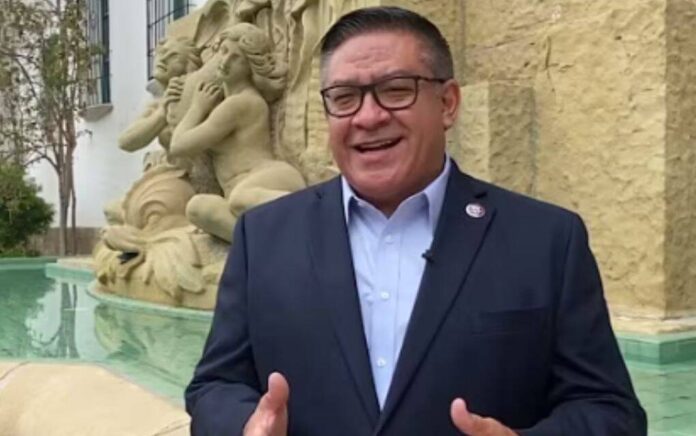
Democrats love to call themselves the party of kindness and diversity. But they hate their political opposition.
And now a House Democrat’s just lost his cool in the middle of a Congressional hearing on Trump’s Secretary of Defense.
Democrats’ Theatrical Takedown of Hegseth Falls Flat in Budget Hearing
On Thursday, the House Armed Services Committee hearing on the Department of Defense’s Fiscal Year 2026 budget request turned into a stage for Rep. Salud Carbajal, a California Democrat, to unleash a fiery verbal assault on Defense Secretary Pete Hegseth. In a moment clearly crafted for viral clips, Carbajal labeled Hegseth an “embarrassment” to the United States and demanded he “get the hell out” of the Pentagon. The outburst followed Hegseth’s dismissal of one of the lawmaker’s questions as “silly,” exposing the Democrat’s apparent hunger for a soundbite over substantive dialogue.
The hearing, meant to scrutinize the Pentagon’s $961 billion budget proposal, quickly devolved into a spectacle as Carbajal pressed Hegseth with a series of yes-or-no questions designed to corner the secretary. The tension ignited when Carbajal zeroed in on the deployment of National Guard and U.S. Marines in Los Angeles to address unrest sparked by anti-ICE protests. “Let’s call it for what it is. It’s political theater. Hegseth, are the Marines in Los Angeles ordered to protect property by any means necessary?” Carbajal asked, framing the issue with a flourish that seemed more suited for cable news than a congressional hearing.
Hegseth, unruffled, pushed back. “Sir, I would say the ICE officers and police officers being attacked is not political theater,” he responded, refusing to play along with the simplified narrative. Carbajal, visibly frustrated, interrupted: “Just yes or no?” The secretary maintained his composure, stating, “The National Guard and Marines have the full authority to protect federal ICE agents.” But Carbajal, determined to steer the exchange toward a gotcha moment, pressed harder. “Yes or no? Can you just say yes or no? This isn’t Fox anymore. Just yes or no,” he snapped, invoking Hegseth’s past as a Fox News commentator to score points.
The Democrat’s insistence on yes-or-no answers felt less like oversight and more like a performance, as if the goal was to trap Hegseth into a quip that could dominate social media. At one point, Carbajal escalated his rhetoric, declaring, “Kindergartners can give me a yes or no,” before pivoting to a loaded question: “Do you think political allegiance to Trump is a requirement for serving our nation, either in uniform or a civilian in the department?” The question, dripping with insinuation, was a clear attempt to paint Hegseth as a partisan loyalist rather than a public servant.
Hegseth didn’t take the bait. “Congressman, you know what a silly question that is,” he replied, calling out the question’s absurdity. This retort appeared to unravel Carbajal, who abandoned any pretense of constructive inquiry. “You know what? I’m not going to waste my time anymore. You’re not worthy of my attention or my questions. You’re an embarrassment to this country. You’re unfit to lead. And there’s been bipartisan members of Congress that have called for your resignation. You should just get the hell out and let somebody competently lead this department,” Carbajal erupted, his words practically begging for a viral retweet.
The outburst prompted an immediate call for decorum from the committee chair, but the damage—or, from Carbajal’s perspective, perhaps the desired effect—was done. The exchange overshadowed the hearing’s purpose: to evaluate a budget that Hegseth described as a cornerstone of President Trump’s America First agenda. In his opening statement, Hegseth had outlined the administration’s priorities: “Under President Trump’s leadership, this budget puts America first and gives our warriors what they need. The $961 billion budget request—more than 1 trillion in total for national security—ends four years of chronic underinvestment in our military.”
Hegseth emphasized a return to what he called a “warrior ethos,” detailing a focus on “war fighting, lethality, meritocracy, standards, and readiness.” He continued, “We are restoring the warrior ethos. President Trump charged me to focus relentlessly on war fighting, lethality, meritocracy, standards and readiness. And that is exactly what we’ve done since day one. We are refocusing on what is truly important, which is war fighting and our warriors, sweeping away distractions and bureaucracy. We are setting standards that are high, equal and unwavering.”
The secretary also touted the administration’s shift away from diversity, equity, and inclusion initiatives. “DEI is dead. We replaced it with a colorblind, gender-neutral, merit-based approach. Our forces are responding incredibly to these changes. Because of President Trump and his America First priorities, recruitment and retention under this administration are higher than they’ve been in decades. Historic numbers of young Americans are putting on the uniform and raising their right hand because they believe in the leadership they see,” Hegseth declared, framing the policy changes as a triumph.
Yet, for Carbajal and his Democratic colleagues, the hearing seemed less about grappling with these policy shifts and more about landing rhetorical punches. The California lawmaker’s approach mirrored a common trend for Democrats these days: prioritizing memorable moments over meaningful policy debate. By reducing complex issues to yes-or-no demands, Carbajal’s questioning risked trivializing the serious matters at hand, such as the role of federal forces in domestic unrest or the Pentagon’s budget priorities.
Hegseth, for his part, remained focused on the administration’s agenda, even as Democrats sought to derail the conversation. He addressed international alliances, stating, “We applaud allies who are stepping up, but others need to do more, and they need to do it quickly and at the NATO heads of state meeting later this month, we expect our NATO allies to commit to 5% of GDP on defense and defense related investments, something that was almost inconceivable before President Trump led the charge in his first administration and continues in this one.”
Carbajal’s theatrics were not an isolated incident but part of a pattern seen in congressional hearings, where lawmakers often seem more interested in crafting shareable content than engaging in substantive oversight. The California Democrat’s outburst, while fiery, risked coming across as performative, especially when contrasted with Hegseth’s measured responses. The secretary’s refusal to be boxed into simplistic answers frustrated Carbajal’s apparent goal of generating a clip that could rally partisan supporters online.
The hearing revealed a stark divide: on one side, an administration pushing a controversial but clearly articulated vision for the military; on the other, Democrats eager to capitalize on the moment for political gain. Carbajal’s decision to berate Hegseth rather than probe deeper into the budget’s implications—such as the trade-offs of prioritizing lethality over other programs—suggested a missed opportunity for real accountability. Instead, the exchange became fodder for the endless cycle of outrage and applause that dominates political discourse.
As the hearing progressed, other lawmakers attempted to steer the conversation back to the budget, but the shadow of Carbajal’s outburst lingered. The episode served as a reminder of how quickly congressional hearings can morph into arenas for grandstanding, particularly when cameras are rolling. For Democrats, the temptation to chase viral moments often overshadows the harder work of crafting nuanced critiques or proposing alternatives.
Hegseth’s budget proposal, with its emphasis on meritocracy and war-fighting readiness, raises legitimate questions about the future of the Pentagon’s priorities. Yet, those questions were largely drowned out by the spectacle of Carbajal’s tirade. The Democrat’s approach—reducing complex issues to soundbites and insults—may have won applause from some corners but did little to advance the public’s understanding of the stakes involved.



















